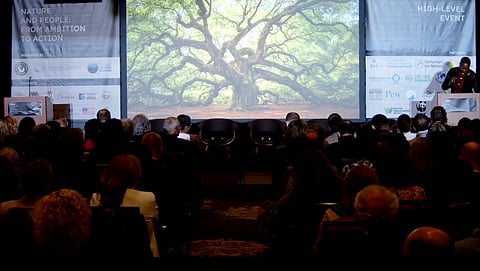

At a high-level event, Nature and People: From Ambition to Action, at the ongoing 78th session of the United Nations General Assembly in New York, the government of Germany pledged to contribute 40 million euros to the Global Biodiversity Framework Fund (GBFF).
With this, the Fund, crucial for meeting the targets and goals set under the Kunming-Montreal Global Biodiversity Framework, has sufficient funds to be operational. The GBFF was ratified in August at the Global Environment Facility Assembly but needed $200 million from at least three donors by December 2023 to be operational. At the Assembly, Canada committed 200 million Canadian dollars and the United Kingdom committed 10 million GBP but this still left a shortfall of $40 million.
Germany’s contribution was made through its International Climate Initiative. At the event, the Federal German Environment Minister Steffi Lemke said that this fund would bring the world one step closer to the main goal of the Kumming-Montreal Global Biodiversity Framework, which is to halt and reverse biodiversity loss by 2030. At least $200 billion is needed each year for this purpose.
The event, which happened in the sidelines of the General Assembly, also saw new contributions toward the ambitious 30X30 target of the Framework. Under Target 3, the world has to protect and conserve 30 per cent of land and ocean by 2030.
Among them was the pledge by New Caledonia to strictly protect 10 per cent of its maritime space by the end of the year. This amounts to more than 130,000 square kilometres of new protected marine area. “This is our contribution toward a sustainable and vibrant future for our people, marine life and ecosystems!” said New Caledonia’s Minister of Environment, Jeremie Katidjo Monnier.
An additional 114,900 hectares of marine ecosystems across Comoros, St Lucia and Vanuatu would be restored under the Small Island Developing States (SIDS) Ecosystem Restoration Flagship project announced at the high-level event. Speaking on behalf of the SIDS Coalition for Nature, Belize Prime Minister Johnny Briceno said SIDS cannot afford to miss this second chance offered by the Global Biodiversity Framework to protect the fragile island ecosystems, sustainably manage nature-based assets and increase environmental resilience.
An indigenous-led finance mechanism, Community Land Rights and Conservation Finance Initiative (CLARIFI), received funds — 5 million euros — from German Federal Ministry for Economic Cooperation and Development (BMZ) to boost the role of indigenous peoples and local communities (IPLC) in decision-making on nature conservation.
The KMGBF recognises the crucial role played by IPLCs in conservation of biodiversity and it is explicitly mentioned in seven of the 23 targets of the Framework that their rights should be respected during the efforts towards meeting the targets.
IPLCs manage over at least 43.5 million square kilometres (32 per cent of global land) in 87 countries but less than 1 per cent of funding for climate and biodiversity protection actually reaches them.
“This is a significant investment in our work, and we are particularly encouraged to see BMZ’s flexibility in working with our model of fit-for-purpose funding, which is flexible, long-term, gender-inclusive, timely and accessible, and mutually accountable with the goal of securing tenure rights and conservation outcomes,” said Deborah Sanchez, director, CLARIFI.